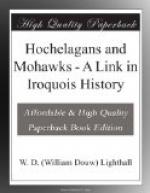A minor question to suggest itself is whether there is any connection between the names “Iroquet” and “Iroquois”. Were they originally forms of the same word? Or were they two related names of divisions of a people? Certainly two closely related peoples have these closely similar names. They were as clearly used as names of distinct tribes however, in the seventeenth century. The derivation of “Iroquois” given by Charlevoix from “hiro”—“I have spoken” does not seem at all likely; but the analogy of the first syllables of the names Er-ie, Hur-ons, Hir-oquois, Ir-oquet and Cherokee may have something in it.
The Iroquets or Hochelagans attributed their great disaster,—the destruction of their towns and dispossession of their island,—to the Hurons, but Charlevoix[9] records an Algonquin victory over them which seems to have preceded, and contributed to, that event, though the lateness of Charlevoix renders the story not so reliable in detail as the personal recollections of the Iroquets above given: His story[10] given “on the authority of those most versed in the old history of the country”, proceeds as follows: “Some Algonquins were at war with the Onontcharonnons better known under the name of Tribe of Iroquet, and whose former residence was, it is said, in the Island of Montreal. The name they bear proclaims, they were of Huron speech; nevertheless it is claimed that it was the Hurons who drove them from their ancient country, and who in part destroyed them. However that may be, they were at the time I speak of, at war with the Algonquins, who, to finish this war at one stroke, thought of a stratagem, which succeeded”. This stratagem was an ambush placed on both sides of the River Becancour near Three Rivers, with some pretended fishermen out in canoes as decoys. The Iroquets attacked and pursued the fishermen, but in the moment of victory, a hail of arrows issued from the bushes along both shores. Their canoes being pierced, and the majority wounded, they all perished. “The tribe of Iroquet never recovered from this disaster; and none to day remain. The quantity of corpses in the water and on the banks of the river so infected it, that it retains the name of Riviere Puante”; (Stinking River).
Charlevoix[11] gives, as well supported, the story of the origin of the war between the Iroquois and Algonquins. “The Iroquois had made with them a sort of alliance very useful to both.” They gave grain for game and armed aid, and thus both lived long on good terms. At last a disagreement rose in a joint party of 12 young hunters, on account of the Iroquois succeeding while the Algonquins failed in the chase. The Algonquins, therefore, maliciously tomahawked the Iroquois in their sleep. Thence arose the war.




